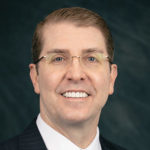
It can be difficult for providers to keep up with today’s evolving healthcare technology. From artificial intelligence (AI), telemedicine and wearable technology to remote monitoring and robotic surgery, innovations are appearing on a regular basis.
Some of these advancements are leading to more accurate diagnostics, lowering the risk for infections and/or shortening hospital stays. Across the continuum of care, providers are finding efficiencies and improvements, such as more precision in surgical procedures, and staff spending less time transcribing and inputting data.
Suggestions for effectively navigating a market that is often more reactive than proactive was part of the discussion at an innovation panel moderated by Chris Stewart, VP of Medical Device Management, during the HealthTrust University Conference (HTU) in August.
Joining me as panelists in that program were Physician Advisors Jeffrey Carter, M.D., and Christopher Page, M.D. For this edition of The Source, Physician Advisor Gary Siskin, M.D., also contributed to the discussion. (See Navigating Innovation Overload.)
Total cost of new tech
To assist healthcare organizations undertaking the due diligence needed to move innovation forward, HealthTrust often utilizes input on emerging technology from physicians who are part of its robust Physician Advisor Network. These physicians are called upon throughout the year to provide expertise on clinical sourcing decisions related to their area of specialty.
In addition to clinical outcomes, panelists discussed the importance of understanding big-picture outcomes related to quality and cost as part of the vetting process (for example, considerations such as cybersecurity risks, waste mitigation, overall cost and the potential for cost reduction). Stewart explained that in order to truly assess the total cost of new tech, it is imperative to also budget for software upgrades, training, service, regulatory compliance and the IT needed to operate and maintain a new technology.
Member voice
Conveying HealthTrust’s process for vetting new technology and the fact that “all members have a voice” were also topics of discussion at another HTU session highlighted on page 24 of this edition. Members of HealthTrust’s Clinical Operations and Clinical Services teams—Emily Healy, Pam Norman, Tara Roth and Jennifer Westendorf—encouraged members to join the HealthTrust Huddle to suggest innovative solutions or to provide feedback on those shared by other members. On-contract and prospective suppliers can visit the Innovation Center to submit their innovative products for potential consideration.
We would love to hear how innovation is vetted within your organization and ways you’ve seen it transform the work. Please email us at thesource@healthtrustpg.com.
In the meantime, be well.
John Young, M.D., MBA, FACHE
Chief Medical Officer, HealthTrust Performance Group
Executive Publisher & Editor-at-large, The Source magazine
Proposals for sessions to be considered for presentation at the 2025 HealthTrust University Conference are being accepted through Dec. 10.
Share Email AI, HTU, Innovation, Q4 2024




